As the surge of the respiratory virus RSV spreads to even more parts of the country and continues to pack emergency rooms and intensive care units with toddlers and infants, parents of children fighting the illness are sharing their stories to increase awareness of RSV signs and symptoms.
Cheyanne Childers, whose 2-month-old son Ryder was hospitalized overnight with RSV, called the experience "terrifying" in a segment aired on TODAY Thursday. "It's a serious illness. With him being this young, he doesn't have an immune system to fight it off, so I just have to trust the doctors and nurses to take care of him."
"Look up the symptoms of RSV especially, and trust your gut because I was on the border about coming or not to the hospital and I feel like I probably should've come a little bit sooner," Childers advised fellow parents.
In Arizona, where Childers and Ryder live, RSV cases are up 344% compared to a typical season, according to the Arizona Department of Health Services.
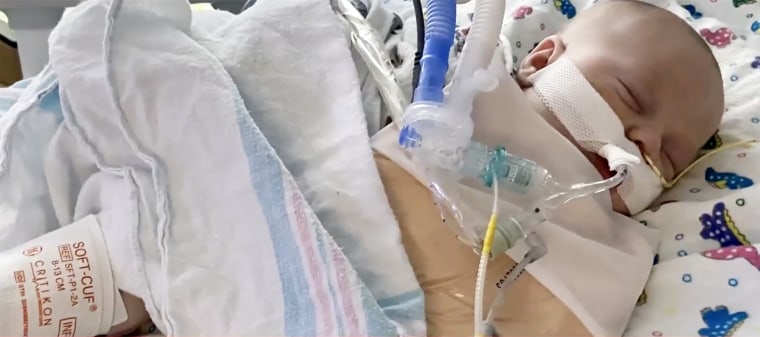
Cory Robertson of South Carolina said his 7-week-old son needing a ventilator due to an RSV infection left him “very scared.”
“I definitely had fear that I never felt before, fear of the unknown,” he told TODAY.
Fernanda Castenares, who's caring for an infant sick with RSV in San Diego, called attention to how baby Alejandra's appearance changed due to the virus.
"She was struggling to breathe ... and we got scared because she had no color at all on her skin. She was very pale," Castenares told TODAY in Thursday's segment.

Cory Robertson of South Carolina said his 7-week-old son needing a ventilator due to an RSV infection left him "very scared."
"I definitely had fear that I never felt before, fear of the unknown," he told TODAY.
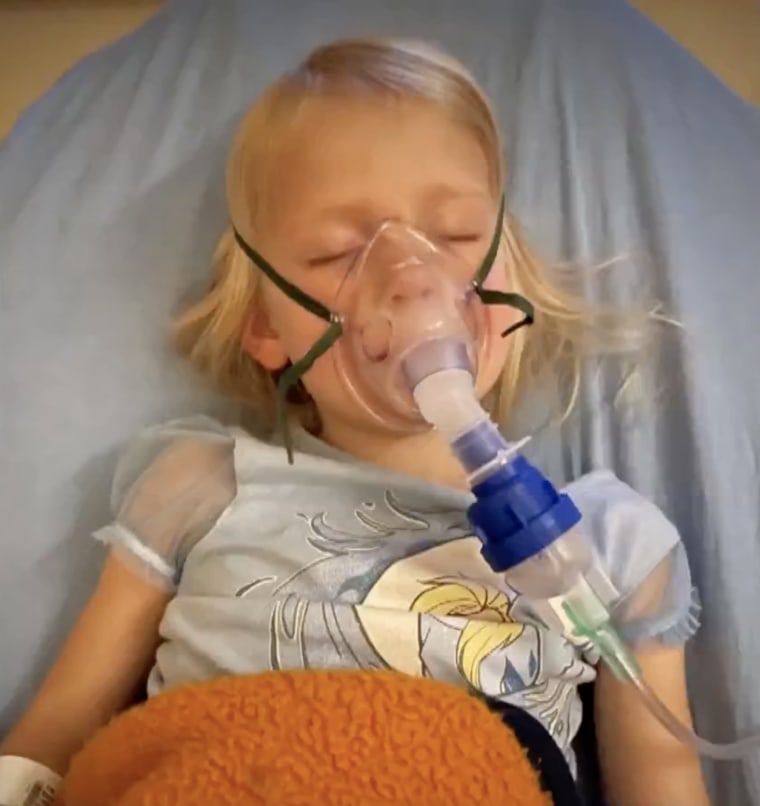
But it's not just infants under 6 months, who are high risk for severe illness from RSV, getting caught in the wave of new cases. Three-year-old Izzy Bankey of Washington, D.C., is recovering from RSV after requiring breathing assistance.
"Nobody wants to hold their kid down and hold a mask on their face," Izzy's mom, Kate Foster-Bankey, told TODAY on Thursday. "She's screaming and trying to rip the breathing tubes out, and that breaks your heart as a parent."
Children's hospitals reach capacity amid 'tripledemic' concerns
Since early October, children’s hospitals around the country have been filling up with kids sick from respiratory viruses, including RSV. This surge has come much earlier in the season than usual, catching health workers off guard, and many of the youngest patients are experiencing more severe symptoms than what these viruses usually cause, TODAY previously reported.
Several states, such as Rhode Island, Delaware and Maine, are reporting that their pediatric hospital beds are more than 80% full, largely due to RSV.
“It’s very worrisome because we’re not even in winter. It’s still only fall,” Tracey Ginaitt, children’s floor clinical manager at Hasbro Children’s Hospital in Providence, Rhode Island, told TODAY in a segment aired Tuesday. “As the winter hits, as flu starts coming, where are we going to put these kids?”
Ginaitt’s hospital is already operating at 125% capacity, using parts of the facility it never has before. Half of the patients in the intensive care unit have RSV. A hospital in nearby Connecticut is facing its worst RSV surge in 25 years, calling in the National Guard for help.
RSV and other respiratory viruses in children are surging now likely for multiple reasons, experts previously told TODAY.
First, the COVID-19 pandemic has changed the seasonality of viruses that used to follow fairly regular patterns, such as RSV, which usually just starts circulating in the fall. Second, the past two years’ mitigation measures suppressed transmission of these viruses, so children didn’t develop immunity, leaving them vulnerable as mitigation measures become less common.
What’s more, this flu season is expected to be severe, with several states, especially in the South, already seeing high levels of influenza activity, according to the U.S. Centers for Disease Control and Prevention. Peak flu season usually doesn't start until December. And another COVID-19 wave is likely around the corner, TODAY previously reported. The possibility of the three viruses to be surging at the same time has been dubbed a “tripledemic.”
Deciding whether to go to the emergency room
After Shanisty Ireland's 2-month-old son, Asa, fell ill with RSV earlier this month, she remembers thinking to herself, "Here we go again," the mother of four told TODAY. When Asa's big brother Adam was diagnosed with and recovered from the respiratory virus at 6 weeks old six years prior, she learned the hard way how to recognize signs that an infant with RSV needs medical attention.
Ireland, who lives in Columbus, Ohio, first heard the term RSV, short for respiratory syncytial virus, from the doctor who diagnosed Adam, telling her to watch him closely. The problem was Ireland didn't understand what exactly she was supposed to look for, even after researching online.
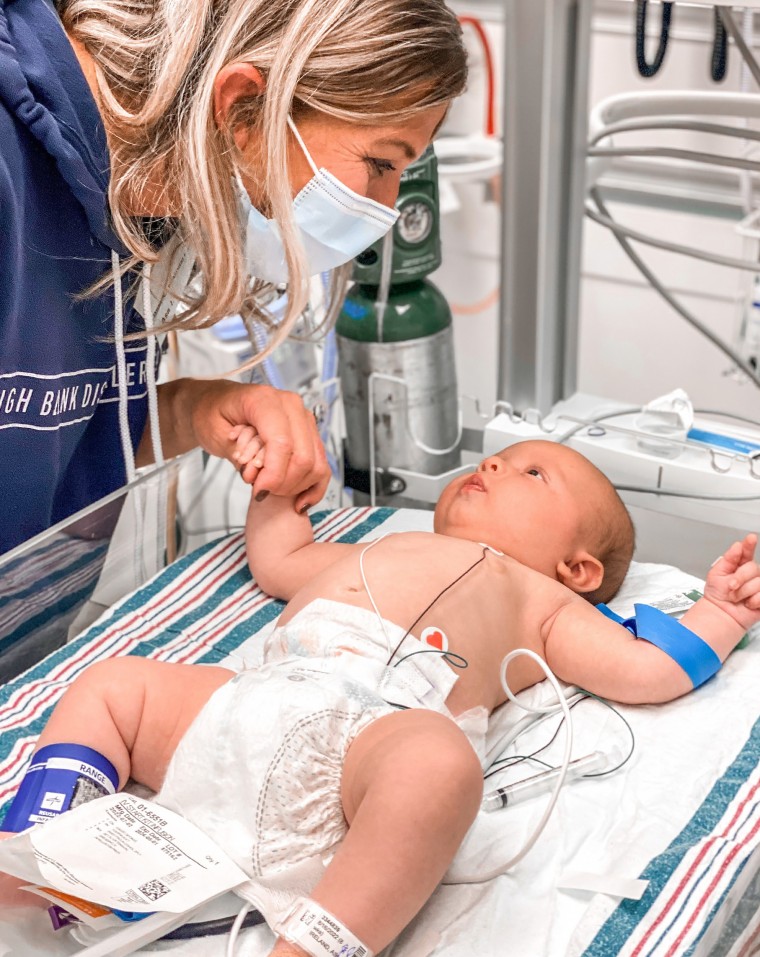
"I didn't really know the danger (Adam) was in because of his age," she recalled to TODAY on a segment aired Friday.
But when Ireland noticed baby Adam's "restricted, labored breathing," she knew to take him to the hospital.
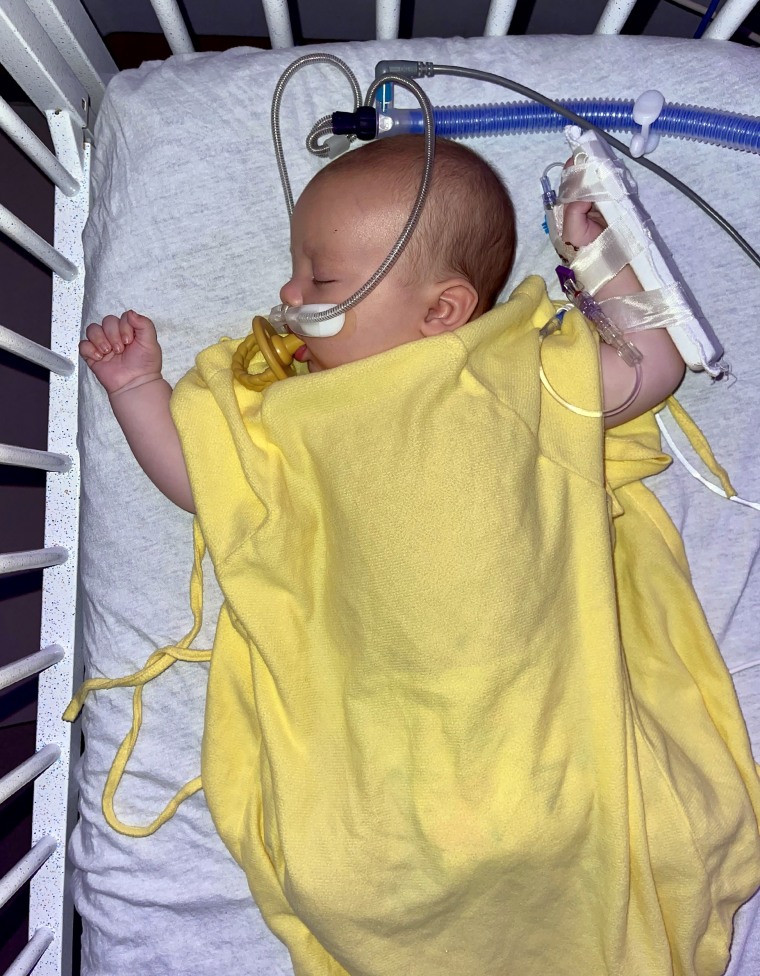
"He was in grave condition," she said. "It was very severe. He had bronchitis, he had rhinovirus, he had RSV, he had ear infections. ... As a mother, I felt extremely guilty that I let it get that far. ... I was scared. I had no idea what my child had, and I had no idea that he was quite frankly fighting for his life."
Flash forward to mid-October 2022, and Ireland noticed baby Asa experiencing signs of a cold. As Asa’s illness (which he likely caught from an older sibling) progressed, Ireland monitored his breathing by unzipping his onesie and looking at his ribs.
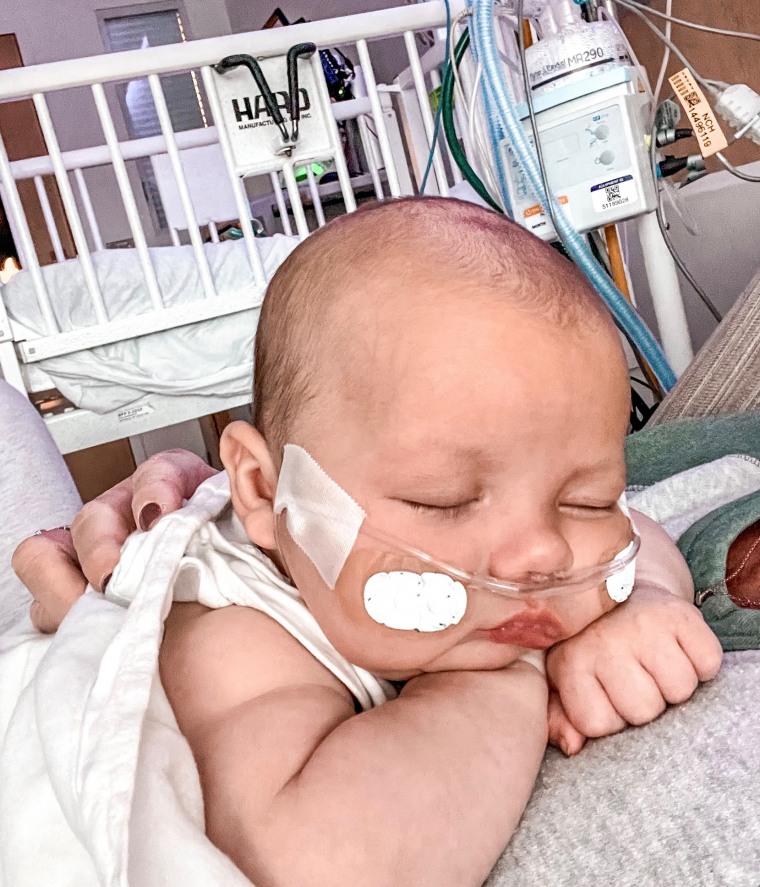
"I could tell his ribs were contracting," she said. "I saw a V underneath his neck that showed he was really labored, and his head was bobbing every time he was trying to breathe. It was it was a big struggle for him to get a breath of air."
She and Asa went the emergency room, and he was in the hospital four days, leaving Oct. 19.
Dealing with RSV again "was terrifying," Ireland said. "I was standing there in trauma, talking to doctors and nurses, and I’m just bawling my eyes out, and they were trying to explain to me what was going on. What I felt like saying was, 'I know, we’ve been here before,' but I just sat there and cried because I just thought to myself, 'How can I let another one of my children go through this?'"
"If you’ve seen a child in that kind of distress with that labored breathing, it’s the most terrifying thing as a parent because you’re completely helpless. You have no idea what to do," she added.
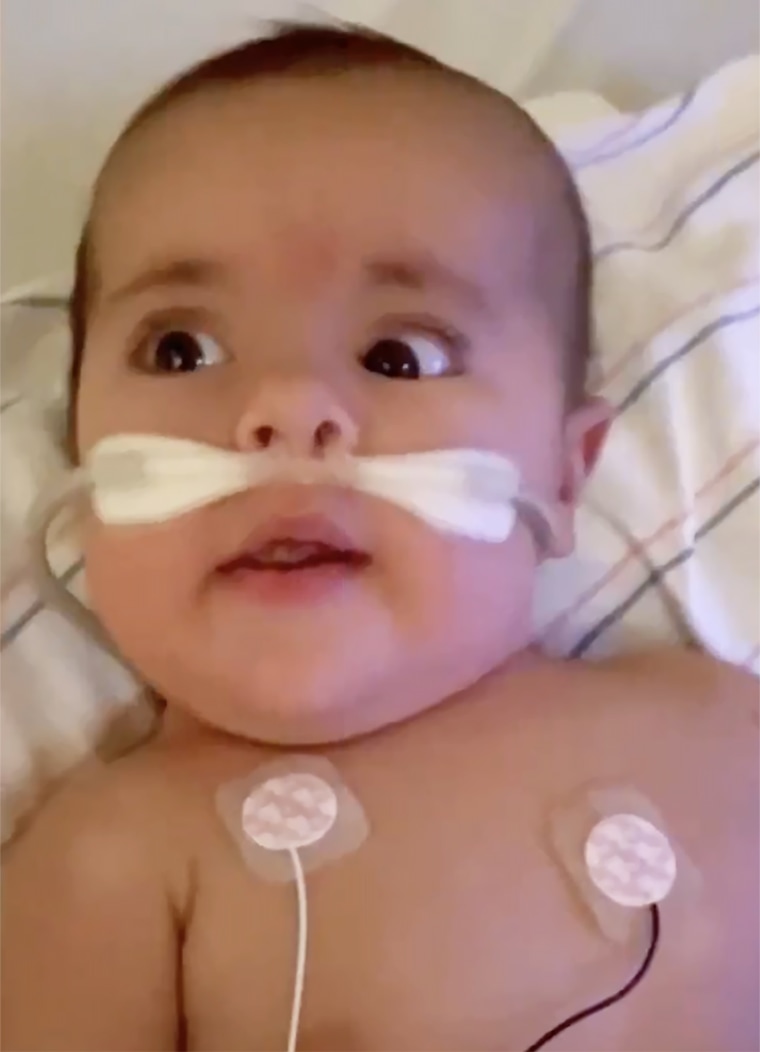
The Vaccas of Albany, New York, lived a similar nightmare to Ireland when they noticed their 4-month-old daughter Georgia's cough was getting worse as they were about to take her to day care.
"Her breathing, you could hear (her) not just sounding very congested, but her chest was doing a lot of up and down rapid movements, contracting," Bill Vacca told TODAY in a segment aired Monday.
After a quick video call to their pediatrician, the Vaccas took their daughter to the emergency room, which was "so packed" with infants sick with RSV, Vacca said. Georgia was admitted to the hospital for four days, requiring oxygen and deep suction every few hours to clear mucus from her airways. Prior to Georgia's illness, they had no idea what RSV was, either.
"We were definitely terrified, especially when we saw that she needed to go on oxygen and had the tubes in her nose and all the cords hooked up to her," Vacca said. "We all had a moment of crying and couldn’t believe that this was happening."
Offering advice to fellow parents, the Vaccas said to trust your instincts when you feel your child needs medical attention, and don't be afraid "to overreact," as they weren't initially sure their daughter's illness met the bar to go to the emergency room.
What are the signs of RSV in young children?
Infants less than 6 months old, premature babies, and kids with weakened immune systems, or chronic lung or heart disease are all at high risk of severe illness from RSV, which usually causes mild, cold-like symptoms in adults, according to the CDC. The early signs of RSV in young children include runny nose, decrease in appetite and cough, which may progress to wheezing, per the CDC.
NBC News senior medical correspondent Dr. John Torres recommends contacting a health care provider if your child:
- Shows signs of poor feeding and low appetite.
- Is irritable or cries and cries and cannot be consoled.
- Is lethargic, meaning they're hard to wake up and aren't able to pay attention to anything.
- Shows signs of labored breathing, such as wheezing or if the ribs are visible or the nostrils flare out when they're breathing.
Treatment for RSV is usually supportive care, such as rehydrating and managing the airways. There's no vaccine against RSV so the best way to protect your child is to prevent an infection by:
- Cover coughs and sneezes with something other than your hands.
- Wash your hands often with soap and water for 20 seconds.
- Avoid close contact with others, including kissing and sharing cups and utensils.
- Clean frequently touched surfaces.
- Wear a high-quality mask in crowded, indoor settings.
"It’s important to understand what the warning signs are. It’s important to understand what labored breathing actually looks like," Ireland said. "If you have a feeling that your child is in distress, count their breaths and see how many breaths they're taking per minute."
"If you feel as though you have a cold coming on or if you have the sniffles, just stay away," she continued. "Don’t kiss the baby. Don’t hold the baby."
"There’s nothing to feel ashamed of if your child contracts RSV," Ireland added. "It’s way more common than people even understand. ... It can hit anybody at any time."